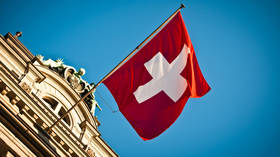Swiss bank worked with WW2 Nazis until 2020 – US Senate

The troubled Swiss bank Credit Suisse hampered the investigation into accounts possibly held by high-ranking German Nazis and SS officers, some of which turned out to be active for decades, the US Senate announced on Tuesday.
The Senate Budget Committee published the findings on Holocaust Remembrance Day, after issuing its first subpoena since 1991 to obtain the results of the bank’s internal investigation. While the reports are incomplete, they revealed “nearly 100” previously undisclosed accounts linked to the Nazis, and raised new questions about Credit Suisse’s potential support for the ‘ratlines’ the defeated Germans used to flee Europe after 1945.
“When it comes to investigating Nazi matters, righteous justice demands that we must leave no stone unturned. Credit Suisse has thus far failed to meet that standard,” Senator Chuck Grassley, an Iowa Republican and ranking member of the committee, said.
Credit Suisse launched the probe in March 2020, after the Simon Wiesenthal Center claimed to have credible information about accounts potentially holding money looted from Jews during the Holocaust.
The final reports showed Credit Suisse appears to have maintained accounts for “at least 99 individuals,” either senior officials in Nazi Germany or members of a Nazi-affiliated groups in Argentina. Seventy accounts “with plausible links” to Argentina-based Nazis were opened after 1945, and at least 14 remained open as recently as 2020. However, no current or dormant accounts were found.
The bank held accounts for at least 21 “notorious high-level Nazis” from a list provided by the Wiesenthal Center, including an SS officer sentenced by the Nuremberg war crimes tribunal. The probe found accounts for a German executive acquitted by the tribunal and a Nazi scientist, neither disclosed in previous probes. Credit Suisse was part of a $1.25 billion settlement with Holocaust survivors in 1998.
The reports were only obtained after the Senate Budget Committee issued a subpoena, citing its role in approving the budget for the State Department’s Office of the Special Envoy for Holocaust Issues.
Credit Suisse had hired the forensic research firm AlixPartners Ltd to run the review, and US lawyer Neil Barofsky – a former federal prosecutor in New York – to act as an independent ombudsman AlixPartners. In June 2022, Credit Suisse’s newly hired General Counsel Markus Diethelm “temporarily paused” the probe.
While AlixPartners was allowed to resume work in October, Barofsky was dismissed in November. Although Barofsky’s contract required him to produce a public report, Credit Suisse insisted on certain redactions, and it was only provided to the Senate under subpoena.
The bank “established an unnecessarily rigid and narrow scope, and refused to follow new leads uncovered during the course of the review,” Grassley said, citing the reports by both Barofsky and AlixPartners.
For example, the bank’s search parameters did not allow the review of legal entities, as well as an account belonging to a Nazi living in Bolivia, citing geographical restrictions. Credit Suisse also refused to look into 366 names that Barofsky and AlixPartners identified in historical books on the ratlines.
As a result of pressure from the US Senate, Credit Suisse has agreed to investigate its potential role in the ratlines. The bank almost failed last month, but the Swiss central bank and regulator FINMA declared it to be of “systemic importance” and brokered a takeover by rival UBS worth 3 billion Swiss francs ($3.3 billion).













